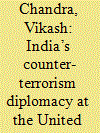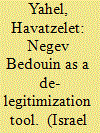| Srl | Item |
| 1 |
ID:
173799


|
|
|
|
|
| Summary/Abstract |
This paper analyses India’s counter-terrorism diplomacy at the United Nations and argues that it is based on five pillars namely, normative, coercive, legal, compliance and domestic implementation, and promotion of international cooperation. The normative pillar elucidates India’s stand on de-legitimisation of terrorism, the root cause approach and sectoral versus comprehensive approach, whereas the coercive pillar divulges India’s position on counter-terrorism sanctions and the use of force. The legal measure explains India’s contribution to the development of international legal framework against terrorism through its sponsoring, co-sponsoring, draft proposal and consensus-building initiatives. Methodologically, it is based largely on the analysis of the primary archival sources, speeches of Indian delegates at the UN General Assembly, its Sixth Committee, and India’s national reports submitted to the UN Counter-Terrorism Committee and 1540 Committee. By analysing India’s counter-terrorism diplomacy at the United Nations, this paper seeks to spark a discourse among researchers working in this field with cases of India and other states as well, and pave the way for further researches on India’s counter-terrorism diplomacy at the United Nations and comparative studies with cases of other states. It concludes with observations that state sovereignty remains at the core of India’s counter-terrorism diplomacy and given the divergence of preferences of states, India’s diplomatic endeavour could not yield desired results.
|
|
|
|
|
|
|
|
|
|
|
|
|
|
|
|
| 2 |
ID:
177573


|
|
|
|
|
| Summary/Abstract |
This article explores the evolution of Bedouin international advocacy and discourse within UN human rights bodies, starting with the first in 1998 to present. It demonstrates that during the last two decades, Bedouin international advocacy in UN bodies was carried out by various NGOs with differing agendas. The discourse on Bedouin issues was co-opted by national and foreign NGOs, some of which possessed clear anti-Israeli views. Parallel to the increasing volume of Bedouin international involvement, their issues became an asset in the overall efforts to de-legitimise Israel. The Bedouin’s harsh living conditions and ongoing land conflict with the state assisted in portraying Israel as an apartheid state.
|
|
|
|
|
|
|
|
|
|
|
|
|
|
|
|